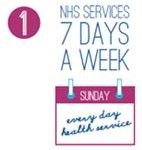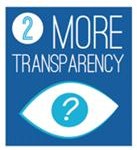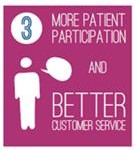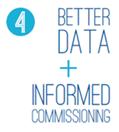
“Healthcare success in the future will be judged on the quality of outcomes.”
From April 2013, improvement in the NHS will be driven by clinical commissioners. The NHS Commissioning Board has published this planning framework with supporting material to help health organisations meet three key objectives:
- Seamless management of organisational change
- Capacity-provision for clinical commissioning groups to push through local health priorities
- Managing immediate requirements with sustainability, so that quality is improved now and continues to improve.
A big part of this involves making the NHS more patient-focused, and so the following five offers are being made via this framework:
 Routine NHS services available seven days a week – by providing greater access, the NHS is hoping to improve patient health and reduce costs. A forum has been formed to identify how this offer can be achieved, and a report outlining suggested improvements will be available in Autumn 2013. The main focus will be on improving diagnostic procedures and use of urgent and emergency care services, with a view to avoiding emergency care where it is inappropriate, e.g. when the treatment can be carried out in a non-emergency setting such as in the community. Naturally, the clinical commissioning groups “will ensure that primary and community based services also deliver a high quality responsive service both in and out of hours.”
Routine NHS services available seven days a week – by providing greater access, the NHS is hoping to improve patient health and reduce costs. A forum has been formed to identify how this offer can be achieved, and a report outlining suggested improvements will be available in Autumn 2013. The main focus will be on improving diagnostic procedures and use of urgent and emergency care services, with a view to avoiding emergency care where it is inappropriate, e.g. when the treatment can be carried out in a non-emergency setting such as in the community. Naturally, the clinical commissioning groups “will ensure that primary and community based services also deliver a high quality responsive service both in and out of hours.”

More transparency, more choice – so that patients can make a fully-informed choice about their treatment regime, the NHS is going to publish details from the national clinical audits about activity data, clinical quality measures, and survival rates, allowing for comparison across hospitals. Commissioners will be responsible for making sure that their providers publish this information, as defined by the Healthcare Quality Improvement Partnership, for every consultant in the following specialties:
- Adult cardiac surgery
- Interventional cardiology
- Vascular surgery
- Upper gastro-intestinal surgery
- Colorectal surgery
- Orthopaedic surgery
- Bariatric surgery
- Urological surgery
- Head and neck surgery
- Thyroid and endocrine surgery
As part of this work, by March 2013, the NHS Commissioning Board will have started to publish evidence-based guidance and tools to support patients, commissioners, and providers.
 Listening to patients and carers and acting on their feedback – when designing and delivering health services, the NHS need to know what consumers think about the services being commissioned, taking action where required. This means that feedback from patients and carers must be regularly and systematically captured, and where appropriate improvement actions should be implemented. This process will be rolled out, with all NHS funded patients being able to leave real-time feedback on any service by 2015. The first feedback to be collected will be whether they would recommend the service to their family and friends.
Listening to patients and carers and acting on their feedback – when designing and delivering health services, the NHS need to know what consumers think about the services being commissioned, taking action where required. This means that feedback from patients and carers must be regularly and systematically captured, and where appropriate improvement actions should be implemented. This process will be rolled out, with all NHS funded patients being able to leave real-time feedback on any service by 2015. The first feedback to be collected will be whether they would recommend the service to their family and friends.
The use of technology is also hoped to involve patients more. With telehealth (delivery of health services via technology) improving access to services, and electronic appointment booking making it easier to manage appointments, patients will find that it is easier to contact their health professionals and therefore get a quicker, more efficient response to their needs, something that should lead to better outcomes.
 Better access to good quality data for commissioners – ensuring that they have the right information to make the best decisions. The NHS number will be vital for this offer to be a success, as it will be the unique identifier for all patients.
Better access to good quality data for commissioners – ensuring that they have the right information to make the best decisions. The NHS number will be vital for this offer to be a success, as it will be the unique identifier for all patients.
For successful planning of secondary care, specific clinical data will be collected anonymously from GP practices for 2013/14, so that clinical commissioning groups can make informed decisions based on the needs of patients. Providers of secondary care will need to keep accurate records so that they can account for what happens to their patients while they are being treated. There will need to be rigorous processes in place to ensure that the individual data is kept safely and securely.
 Higher standards, safer care – NHS commissioners and their providers will be required to address the recommendations made in two reports: Transforming Care: A National response to Winterbourne View Hospital, and The Mid Staffordshire NHS Foundation Trust Public Inquiry. Both of the organisations involved provided very poor care services to their patients, and lessons must be learned. Recommendations are made in both reports and commissioners must ensure that their providers apply these in their organisations, so that the standard of health care is improved throughout the NHS.
Higher standards, safer care – NHS commissioners and their providers will be required to address the recommendations made in two reports: Transforming Care: A National response to Winterbourne View Hospital, and The Mid Staffordshire NHS Foundation Trust Public Inquiry. Both of the organisations involved provided very poor care services to their patients, and lessons must be learned. Recommendations are made in both reports and commissioners must ensure that their providers apply these in their organisations, so that the standard of health care is improved throughout the NHS.
This framework for planning clinical led-commissioning aims to do the following:
- Empower local clinicians so that they can deliver better outcomes
- Increase access to information for patients so that they can make better choices
- Ensure that the NHS is more accountability to the patients it serves.
Link
Everyone counts: planning for patients 2013/14. NHS Commissioning Board, 2012.

